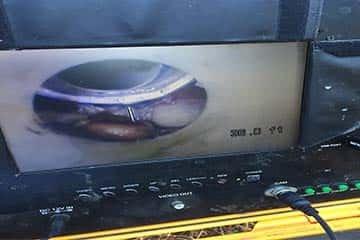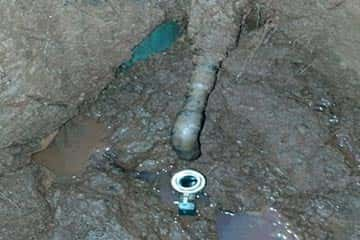From sewer line inspections to sewer replacement, we are your trusted sewer contractors in central Connecticut.
- Sewer replacement
- Sewer repair
- Sewer installation
- Sewer camera inspection
- Sewer cleaning
- Galvanized steel piping
- Copper piping
- ABS piping
- PVC piping
- Bellies & Misalignments
- New lateral piping
Sewer Repair

Maintenance and repairs can be a big responsibility as a homeowner, but essential to keep your home's many systems working as they should. Your home's plumbing system is one of the major systems that requires routine maintenance and repairs to avoid serious issues like water damage and even sewer back-ups. Your home's main sewer line that runs under your property is easily overlooked but if neglected it can develop serious clogs or deteriorate and cause thousands of dollars in damage. Here's what you should know about how your home's sewer works and what you can do to keep it working properly.
How a Sewer System Works
Where does your waste water go when it's flushed down the toilet or flows down the drains? All the water used in your home that flows through your drains first flows through a trap that holds standing water to prevent sewer gases from entering the home. The drain system uses gravity to allow waste water to flow downhill through drain pipes that also connect to a vent pipe system that allows fresh air to enter the drain pipes to prevent suction. The waste water flows to your sewer main that runs under the ground.
If your home is connected to the municipal sewer system, all of the drains in your home are connected to a single sewer pipe that leads to the street. A pipe in the street collects waste water from homes in the area and transports it to a larger pipe until it reaches the waste water collection system at the waste water treatment plant. There, water is cleaned so it can be returned to the environment. If your home is not connected to the city sewer system, waste water instead flows into a septic tank under your ground where solid waste settles out. The water moves into a leach field through pipes buried in the ground.

Common Issues with Sewer Systems
As a general rule, if you have only one drain that isn't working, the problem lies between the main drain and that fixture. If you have more than one but not all of your drains working sluggishly or not draining properly, the problem is somewhere inside the home's internal plumbing system. If all of your drains are failing to drain away and you have water that is even backing up, the problem is with your main sewer line.
There are several common problems that can affect your sewer line:
- Tree roots. Tree roots can easily infiltrate your sewer line, even if the trees are planted far away. Roots naturally grow to seek out water and they can grow through tiny pinholes in the pipe and quickly enlarge and expand. When roots infiltrate your sewer line, they can lead to clogs that prevent water from flowing or damage the pipe and worsen existing damage.
- Clogs. A blockage in your sewer line can result from tree roots as well as grease, solid objects, and a build-up of debris that restricts water flow.
- Corrosion or deterioration of the pipe. If you have an older sewer line that is made from any material aside from PVC, you are at risk of having your sewer line degrade which makes it collapse and restrict water flow.
- Misaligned, broken, or cracked pipe. This is often due to shifting soil or frozen ground that forces the pipe out of place. The stress can cause the sewer line to break, crack, or collapse in places.
- Leaks. If the seals between your pipes break down, the water can leak into the ground surrounding your sewer line.
- Bellied pipe. This happens when part of the sewer pipe sinks into the ground, creating a place for waste to quickly collect.
- Clogged roof vents. Roof vents introduce fresh air into your drain system to prevent suction and allow waste water to flow freely through your drains and into the sewer. A clogged roof vent can make your drains very sluggish.
Why Hire a Licensed Connecticut Sewer Contractor?
Hiring an unlicensed or inexperienced plumbing contractor to repair or replace your sewer pipes can cost you big. While the upfront cost may be lower, hiring an unlicensed contractor comes with many risks.
Licensed contractors are more likely to carry workers' compensation insurance for their employees and have insurance that protects the homeowner. If an unlicensed and uninsured worker is injured on your property, you can be sued for the medical damages and lost wages. Advance Plumbing and Heating has all the proper insurances, so our policy will pay for any work related bodily injury or property damage on your property so you will not be left responsible.
Bonding also protects you as a homeowner. When a contractor is bonded, you will be protected if the contractor does not finish the project, fails to pay subcontractors (which could otherwise result in a lien on your home), or does shoddy work. When you hire Advance Plumbing and Heating for your sewer repair project, our 60 years experience of successful sewer projects in the local community goes a long way at giving you the peace of mind you deserve.
Licensing also helps prove the contractor has the necessary knowledge and experience and really knows the trade. If a contractor has already shown they are unwilling to take the steps and pay to get licensed, where else might they cut corners? Don't risk your home and safety on an unlicensed sewer contractor who may cut corners and do the job incorrectly.
Sewer Maintenance
There are many issues that can affect your sewer line, so it's important to stay vigilant and proactive. Regular cleaning of the sewer line as well as occasional inspections can help you understand the condition of your pipe and when repairs will be necessary.
Prior to cleaning or repairs, a video sewer inspection also known as a sewer inspection camera is recommended for a clear visual inspection of the interior of the sewer line and other underground pipes. With a flexible rod attached to a waterproof camera, a sewer technician can visualize the entire length and diameter of your pipe to better understand existing and potential problems. This inspection removes the guesswork to quickly and accurately diagnose sewer line problems and even pinpoint the precise location of problems. After the video inspection, our sewer specialists can advise you on the best course of action, whether it's hydro jetting, repairs, or replacement.
Hydro jetting is one of the most effective ways to maintain your sewer line. Hydro jetting involves using very high-pressure water jets to blast away blockages in your pipe, including tree roots, mineral build-up, waste, and solid objects. A professional, licensed sewer contractor will use a device that is threaded into your sewer line with a head that contains tiny jets that dispense water at a pressure of up to 4,000 psi.
For restaurants, large facilities and high use sewer systems, our plumbing and sewer specialists can recommend the best steps to maintain your sewer pipe and schedule regular maintenance appointments to stay on top of any problems.